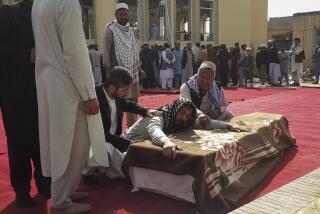Afghan Officials Expect Surrender of Top Taliban
- Share via
KANDAHAR, Afghanistan — More than a dozen fugitive Taliban leaders--including the deposed regime’s chief, Mullah Mohammed Omar--are preparing to come out of hiding and turn themselves in to Afghan and U.S. authorities, according to officials in the southern province of Kandahar.
“Right now we are in contact with more than 15 senior Taliban leaders,” said Khalid Pushtoon, an aide to Kandahar Gov. Gul Agha Shirzai. “We are trying to convince them that they will be treated with dignity and honor.”
On Friday, the Taliban foreign minister, Wakil Ahmed Mutawakel, turned himself in to Afghan authorities and was escorted to the U.S. military base at the city of Kandahar’s airport.
Details and conditions of his surrender remained murky four days later. Pushtoon said that was by design, because he and Shirzai were working to persuade the rest of the Taliban Cabinet to follow in Mutawakel’s footsteps.
At a security meeting at his headquarters, Shirzai said he was confident that Omar would not remain at large much longer.
“Our efforts [in] searching for Mullah Omar are continuing, and soon you will learn about his surrender too,” Shirzai said.
Mutawakel’s surrender was carried out in secret. Kandahar’s police chief, military commander and chief of military intelligence acknowledged in separate interviews that they had not been informed of it either before or immediately afterward.
The Pentagon, as well as Shirzai, confirmed that Mutawakel surrendered to Afghan authorities, not to U.S. forces as some had presumed. The governor was in Europe at the time but said Pushtoon handled the surrender in his absence and personally escorted Mutawakel to the U.S. base, which has a large detention facility. Afghan officials provided no other details.
Secondhand reports suggest that Taliban leaders have remained in hiding largely in and around the Pakistani city of Quetta. Mutawakel apparently crossed into Afghanistan secretly early Friday with the intention of surrendering.
“Nowadays, the condition of Taliban leaders is very, very bad, and they can’t find a suitable place to stay,” said Zabed Akram, Kandahar’s police chief. “A Taliban leader recently contacted me and said the Pakistani police and the United States are getting closer every day.”
Pushtoon said that since surrendering, Mutawakel has been undergoing questioning by U.S. officials at one of perhaps half a dozen American military facilities in and around Kandahar. As the highest-ranking Taliban leader in custody, he is expected to provide valuable intelligence to the United States, possibly including information on the whereabouts of Osama bin Laden.
Mutawakel is believed to have been among the most moderate of the Taliban leaders. He is said to have argued in favor of turning Bin Laden over to the U.S. after Sept. 11, a stance that reportedly caused a falling-out with Omar and other Taliban leaders.
Pushtoon said that because Mutawakel has agreed to cooperate with the United States, he will not be prosecuted. Other Taliban leaders who surrender can expect the same treatment as long as they are not personally responsible for crimes or serious abuses, Pushtoon said.
At least some Afghan officials said they did not believe that Mutawakel should have been turned over to the U.S. and would have preferred that his case be handled by Afghanistan’s interim government and newly appointed supreme court.
“I want to understand myself why he surrendered to U.S. troops and not to Afghans,” said Khan Mohammed, military commander of Kandahar. “I think our supreme court should decide what will happen with him.”
Meanwhile, declaring that his province had achieved a degree of stability unknown for nearly three decades, Shirzai lifted a curfew Tuesday, proclaiming what he called Afghanistan’s first night of freedom.
However, little change was visible on the streets after 9 p.m. Several police officers said the curfew had been loosely enforced anyway, adding that they had received no new orders to alter their procedures for checking vehicles and pedestrians. By 10 p.m., the city was empty of pedestrians and private vehicles.
Shirzai also announced that the opium market in central Kandahar had been shuttered, the first step toward the eradication of opium production in the region.
More to Read
Sign up for Essential California
The most important California stories and recommendations in your inbox every morning.
You may occasionally receive promotional content from the Los Angeles Times.













